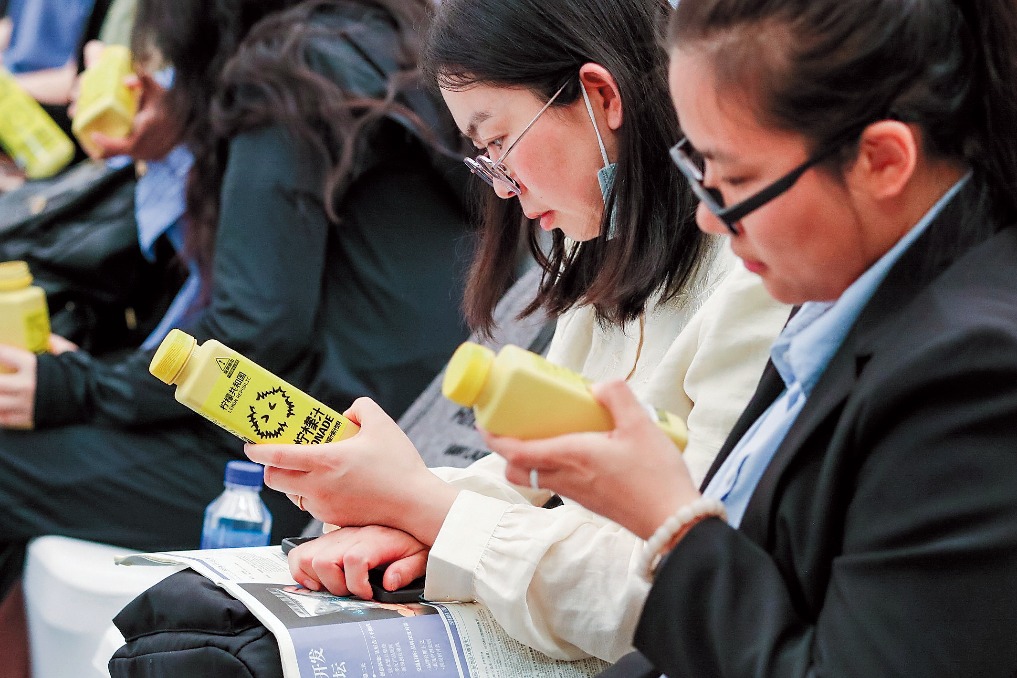Economic activities regaining vitality in world's largest market


SHANGHAI - The ongoing novel coronavirus outbreak has dealt a blow to the Chinese economy.
With stringent and thorough measures adopted to combat the virus, the epidemic continues to ebb away across the country.
Economic activities also begin to regain vitality in the world's largest market, with normal production gradually resuming and market expectations brightening.
Livestream e-commerce
Leaning on the counter of the French cosmetic brand Lancome in New World Daimaru Department Store in Shanghai, shopping assistant Chen Cheng is busy introducing the newest products to consumers.
Instead of face-to-face interaction, Chen is selling products via livestreaming to consumers who choose to shop at home in this special period. Within a couple of days, their online orders will be delivered to their doorsteps.
Chen is one of the salespeople-turned livestream hosts in the department store, which has pinned its hopes on livestream e-commerce to engage consumers and cushion the impact of the outbreak.
In two days, the shopping mall achieved an online sale volume of about 1.88 million yuan ($267,000).
"The consumer market is rapidly recovering. We have the confidence to ride out the pressure brought by the outbreak and maintain a strong sales performance this year," said Ma Mu, manager of the e-commerce management department of the store.
Yet this is far from an isolated case. Amid the epidemic, more Chinese enterprises are launching livestream projects for offline stores to power their e-commerce businesses.
On April 1, Greenland Global Commodity Trading Hub Group cooperated with the Consulate General of Argentina in Shanghai to launch a livestream session to promote signature products from the Latin American country.
Jointly hosted by James Xue, general manager of the Shanghai-based group, and Pablo Agustin Obregon, consul general of Argentina in Shanghai, the livestream session sold wine, shrimp, steak and other products from Argentina to Chinese consumers, attracting 15,000 viewers in one hour.
"As the epidemic recedes, the domestic consumer market is rapidly recovering. Livestreaming has opened up a new channel for delivering goods to stay-at-home consumers," said Xue.
Boosted by multiple livestreaming sessions, in the first quarter of this year, the import business of the group's international trade grew nearly three times from the previous quarter. G-Super, a chain supermarket brand of the group, has also seen a year-on-year increase of over 300 percent in its online sales volume since late March.
Offline business
Besides warming consumption online, offline businesses have also seen a leap.
On April 9, the Ministry of Commerce said the opening rates of large agricultural wholesale markets, large supermarkets, department stores and branded convenience stores nationwide were all above 95 percent.
Average daily sales in key monitored retail enterprises in late March increased by 0.9 percent compared with mid-March and by 3.2 percent from late February.
In the catering sector, the resumption rate has reached 85.4 percent nationwide as of April 5, according to statistics from China's service-focused e-commerce giant Meituan Dianping.
Average daily dine-in orders and restaurant turnover also jumped 118 percent and 158 percent, respectively, during the three-day Tomb-sweeping Day holiday compared with figures from March.
According to a report released by China's leading digital payment platform Alipay on March 23, hot pot recently became the most popular comfort food. Consumers in China paid for more than 1.3 million hot pot meals via Alipay from March 18 to 22, up 186 percent from the previous month.
"Big data showed that businesses are gradually picking up in China," said Chen Wen, president of SUKE Innovation Strategy Research Institute.
According to a report released by Chen's team, on April 8, the national average business recovery ratio reached 78.72 percent, up 13.88 and 29.54 percent, respectively, comparing with the ratios from March 10 and March 1.
The business recovery ratio of 313 cities, accounting for over 85 percent of the total monitored cities, reached over 75 percent.
"Everything is in good order. My life is also gradually returning to normal," said Chen Xuemei, a resident in the eastern Chinese city of Shangrao.
Stimulus measures
In early March, Chinese authorities released a guideline aimed at boosting consumption and unleashing the potential of the domestic market to cushion the blow of the epidemic on economic activities.
A number of Chinese cities have answered the call by rolling out voucher programs.
Wang Renyuan, a 23-year-old citizen of Quzhou city, East China's Zhejiang province, received three coupons issued by the local government.
In order to use a food and beverage coupon, Wang went to a hot pot restaurant with his friends last Sunday. "I only spent about 250 yuan. This meal is quite cost-efficient after using the coupon," said Wang.
From April 4 to 6, more than 3.1 million yuan of coupons has been issued in Quzhou, generating a total consumption of over 18.2 million yuan.
So far, more than 20 provinces and cities in China have launched similar voucher campaigns, worth over 5.6 billion yuan.
Boosted by the economic stimulus measure, according to Yintai Department Store, a famous retail chain, 10 stores in Hangzhou, capital of Zhejiang province, witnessed an increase of nearly 50 percent in passenger flow in the last weekend of March, compared with the first three weekends.
Small business owners also benefit from the voucher campaigns.
Alipay data showed that more than 10 million offline businesses nationwide have benefited from consumption coupon campaigns, of which more than 90 percent are small and medium-sized businesses.
According to the Zhongtai Securities Research Institute, consumption coupons will generate a positive effect on the total retail sales of consumer goods, which may lead to an annual sales growth of over 8 percent this year.
Meanwhile, several Chinese provinces and cities are introducing a 2.5-day weekend to give residents more free time and stimulate tourism.
On March 19, eastern China's Jiangxi province issued a notice, calling on companies to create 2.5-day weekends to give workers more time for short trips. Under the plan, workers are allowed to take off at noon on Fridays before coming back to the office Mondays.
"The plan has detailed supporting measures, and will play a positive role in stimulating tourism consumption," said Cao Guoxin, deputy secretary-general of the Jiangxi Tourism and Culture Research Association.
- China unveils guideline on improving market-based allocation of production factors
- Cross-border e-commerce gains traction
- China's economy resilient despite short-term COVID-19 impact: experts, media
- Precise measures required to meet specific needs of local economies: China Daily editorial
- Zhejiang FTZ to fuel oil, gas sector reforms




































